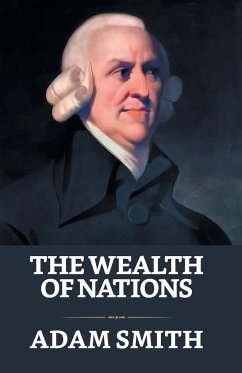
An Inquiry Into the Nature and Causes of the Wealth of Nations
Versandkostenfrei!
Versandfertig in 1-2 Wochen
61,99 €
inkl. MwSt.

PAYBACK Punkte
31 °P sammeln!
On March 9, 1776, An inquiry into the nature and causes of national wealth - often referred to simply as National Wealth - was published for the first time. Smith, a Scottish, philosopher of ethics through marketing, wrote the book to explain the industrial power system that upsets the mercantilist system. Mercantilism emphasized that the economy was limited. The only way to be successful is to hoard gold and tax foreign trade. According to this theory, countries should sell their products to other countries without buying anything. Predictably, countries have entered into a form of reparative...
On March 9, 1776, An inquiry into the nature and causes of national wealth - often referred to simply as National Wealth - was published for the first time. Smith, a Scottish, philosopher of ethics through marketing, wrote the book to explain the industrial power system that upsets the mercantilist system. Mercantilism emphasized that the economy was limited. The only way to be successful is to hoard gold and tax foreign trade. According to this theory, countries should sell their products to other countries without buying anything. Predictably, countries have entered into a form of reparative debt that has stifled international trade.This free market force that Adam Smith called the invisible hand needs support to work its magic. In particular, the market resulting from the increasing division of labor, both in the production process and in society in general, has created a system of dependence. These relationships promote the common good through individual profit motives.In other words, if you are a professional baker and only produce bread, you will depend on someone else for clothing, meat, and beer. In the meantime, the experts in clothing will depend on you for their bread and other things. Economic growth occurs when people want goods and services that they cannot produce themselves.














